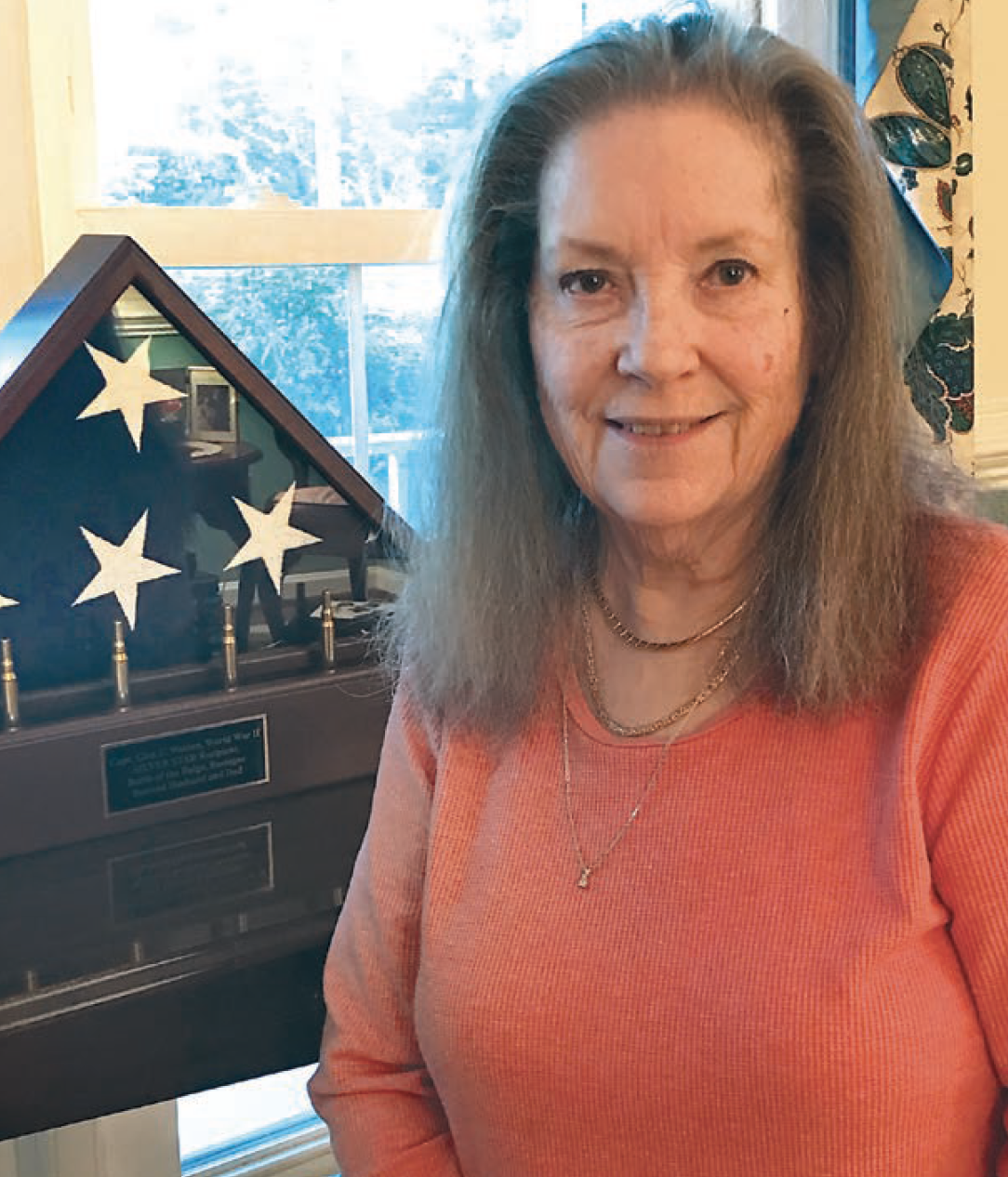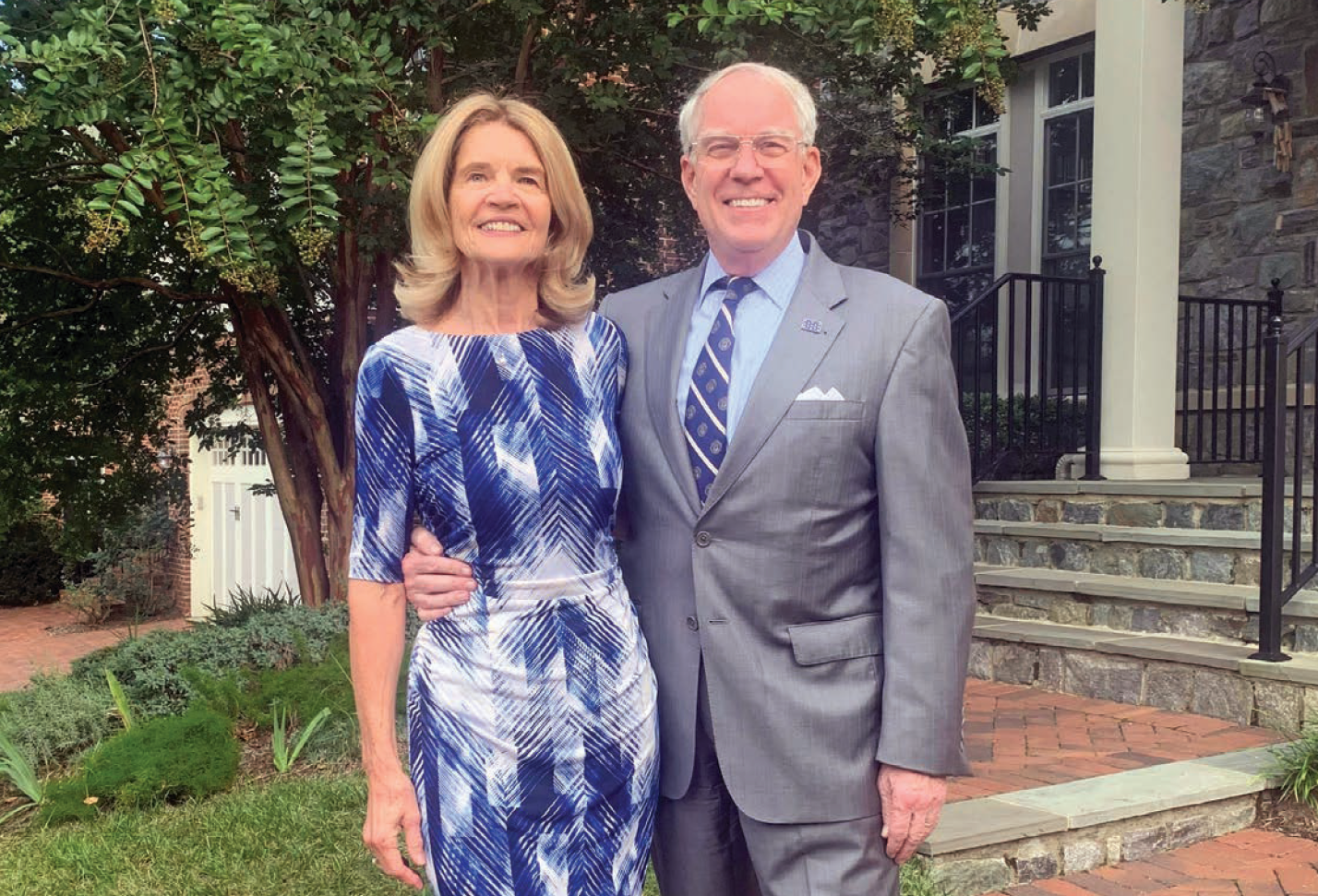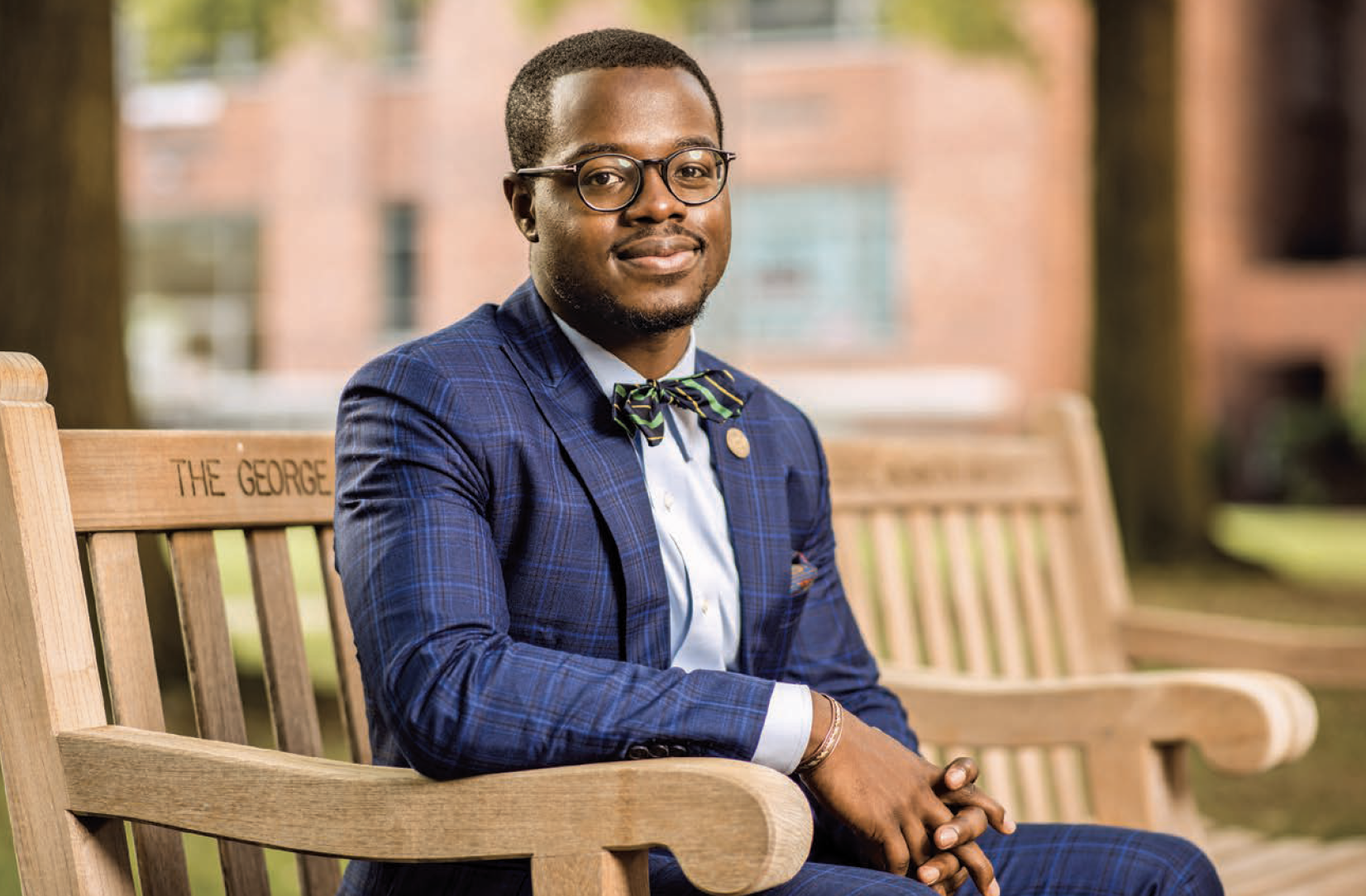By Mary A. Dempsey
After her father's death last year, Nancy Noel knew she wanted to establish a scholarship to honor his long and prominent career in GW Law’s Intellectual Property Law Program. The big decision was how to choose the scholarship recipients. Ms. Noel decided to generously endow the Professor Glen E. Weston Memorial Scholarship as a need-based scholarship. She set it up so it would be available to students as early as this fall.
“Because I spent 33 years teaching in the classroom at the community college level, I am all about helping students have access to college,” says Ms. Noel, a retired professor of English. “I ended up feeling that it was important to provide access to law school to somebody—when they’ve got the ability and great LSAT scores and they’ve been accepted—who couldn’t otherwise afford it. That would be the best way to pay homage to my father,” she says.

Nancy Noel endowed the Professor Glen E. Weston Memorial Scholarship at GW Law in honor of her late father--a beloved GW Law IP professor.
For 40 years, Glen Weston was a much-beloved GW professor who was instrumental in building GW Law’s highly regarded program in Intellectual Property and Technology law. He retired in 1989. He died in July 2020, five days after his 98th birthday.
Ms. Noel’s decision, which she hopes inspires others to support student scholarships, dovetails with GW Law’s push to accelerate the availability of student financial aid. Dean Dayna Bowen Matthew seeks to increase financial support for faculty and students by more than $42 million over the next few years. She
said she will encourage alumni and friends of the school to give, including through bequests or other estate planning. She said she was also reaching out to foundations for support.
Student loan debt is an onerous financial liability in the United States, surpassed only by mortgage debt. In 2020, student debt nationwide reached a record $1.6 trillion.
“Right now, GW Law students graduate with as much as $154,000 in debt, and that’s too much,” Dean Matthew says. By finding ways to make a degree more affordable, Dean Matthew says it will also make GW Law attractive to a more diverse pool of talented students.
Sophia Sim, associate dean of admissions and financial aid, says the dean is especially interested in scholarships with award criteria that combine merit and need.
“When we talk about financial aid, aside from endowments from alumni and scholarships from law firms, we’re mostly talking about need-based grants and merit scholarships,” Associate Dean Sims says. “You don’t have to pay back need-based grants. And a merit scholarship is guaranteed for your entire time here. We are developing a need-based scholarship that will also be guaranteed for the student’s three years at GW Law.
“But right now, when you receive a merit scholarship higher than $16,000 a year, you’re not eligible for need-based grants. The dean would like to raise this number and develop scholarships that take both merit and need into consideration,” she adds.
Associate Dean Sim says that unlike undergraduate colleges, not that many law schools offer need-based grants. Expanding them at GW Law positions the school to enroll a greater diversity of students.
“Our faculty has unanimously resolved to pursue an anti- racist agenda. We are looking to expand enrollment of groups who are racially under-represented in law: African Americans, Native Americans and Latinx Americans,” the dean says, while also extending support to veterans, first-generation, and low-income students.
Earlier this year, Kenneth E. Jaconetty, JD ’88, made a planned gift of $2 million to create an endowed scholarship program offering need-based aid to second- and third-year law students who are active members of the Black Law Student Association or enrolled members of a Native American tribe. The Kenneth E. Jaconetty Scholarship Fund targets students with an interest in intellectual property law.
Currently, just 1.8 percent of lawyers in IP law are Black; 2.5 percent are Hispanic or Latinx; and fewer than 0.5 percent are Native American. This under-representation has not improved in over a decade. Mr. Jaconetty included a cash gift with his commit- ment so the scholarship could be started right away. He says he launched the scholarship, in part, because of the Black Lives Matter demonstrations sparked by the police killings of George Floyd in Minneapolis and Breonna Taylor in Louisville, Ky.
"Because I spent 33 years teaching in the classroom at the community college level, I am all about helping students have access to college."
- Nancy Noel
Easing Financial Worries

Barbara and Wes Burnett recently established the Burnett Endowed Law Scholarship at GW Law--the latest in a long line of gifts to Mr. Burnett’s two-time alma mater.
ASSOCIATE DEAN OF STUDENTS ELIZABETH EWERT has heard students’ stories of how financially daunting it can be to attend GW Law, even when tuition is not part of the calculation.
“D.C. is an expensive place to live. Students tell us regularly they have other lesser, short-term needs that they don’t know how to meet,” she says. “As an undergraduate they might have been on a meal plan or lived in a dorm, but the law school doesn’t have on-campus housing. Law students are often for the first time living in their own apartment and paying their own bills.
“If you live in student housing and your rent is due on Jan. 1 but your student loan doesn’t fund until Jan. 15, it is taken care of,” Associate Dean Ewert explains. “But if you’re off campus, your landlord doesn’t care about your student loan.”
She says even frugal students who stick to a strict budget sometimes have to scrimp for food. A single thing—emergency airfare to see a family member, a medical bill or the need to upgrade technology—can prove intractable. Last year when the COVID-19 pandemic closed the campus and classes were taught online, technology was a serious challenge for many students.
“During the pandemic, students needed to upgrade to run the Zoom platform. They needed reliable Wi-Fi,” Associate Dean Ewert explains.
Unexpected expenses do not necessarily derail law school aspira- tions, but they can prevent students from finishing as quickly as they might otherwise. Associate Dean Ewert says the need to work to pay bills might also preclude students from accepting externships that would help them with their careers.
“I also think there’s a correlation between worrying about money and academic performance,” she says.
In addition to drawing a more racially diverse student enroll- ment, Dean Matthew says greater scholarship support will help the school attract first-generation students, students from rural backgrounds, and students pursing public interest or public service law. GW Law, in large degree because of its location in the nation’s capital, has a long and distinguished network of graduates in public service.
“I have the suspicion that we could be punching above our weight with graduates who go into public service. We graduate people who make legislation, serve in public office, and hand down decisions that will protect democracy,” the dean says. “Look at Susan Wild, who is a member of the U.S. Congress. Or Judge Harold Greene, who was an instrumental contributor to the Civil Rights Act of 1964.”
Rep. Wild currently represents Pennsylvania’s Seventh Congressional District. Judge Greene, who served on the U.S. District Court for the District of Columbia, was chief of appeals research in the U.S. Department of Justice Civil Rights Division when he helped draft both the Civil Rights Act of 1964 and the Voting Rights Act of 1965.
“Our students committed to public service should be able to become public servants without being saddled with debt,” Dean Matthew says.
Wes Burnett, JD ’75 and LLM ’83, and his wife, Barbara, agree. They know firsthand how close-to-the-line law students live. It was Barbara’s salary as a beginning math teacher in Fairfax County that paid her husband’s GW Law tuition.
“We lived in a tenement in Rosslyn, which has since been torn down. We had one car that I drove to Chantilly to work every day,” Mrs. Burnett recalls. She said her husband initially biked to the GW campus but when one bike after another was stolen, he resorted to running to get to his classes.
“It was rough,” Mrs. Burnett says, “and we wanted to spare someone else that kind of situation now that we have the where- withal to do that.”
The Burnett Endowed Law Scholarship is the result; through this scholarship the Burnett family annually opens doors to students who would otherwise be unable to have access to a GW Law education.
GW Law has long been the recipient of the Burnetts’ gener- osity. To mark the new dean’s appointment last year, for example, they created a fund for military veterans and their family members. Over decades of philanthropy, they have supported a range of initiatives at GW, including four other scholarships and a deanship at GW Law.
“I embrace the idea of public service. My parents were in the Navy. Barb’s father was in the Navy. We love the idea of promoting the kinds of values that we see in the George Washington University Law School,” says Mr. Burnett, a former GW trustee, who currently serves on the Law School Dean’s Board of Advisors and the GW Alumni Association Board.
After completing his law degree, Mr. Burnett served in the Judge Advocate General’s ( JAG) Corps in the U.S. Navy. “My GW Law degree allowed me to serve my country for 27 years in uniform. We traveled the world, we lived on three continents, we raised three children,” he says.
Scholarships like the one created by the Burnetts carry deep value, according to Nancy Hullihen, GW’s associate vice presi- dent of development and alumni relations. “Especially for anyone who was a scholarship recipient, this is a great way to pass the generosity along,” she says.
Associate VP Hullihen notes that there are multiple mechanisms for giving, including through estate planning and charitable gift annuities.
“When someone gives, depending on the amount, it could mean the difference in a decision whether to enroll. It can lower a student’s debt on the way out the door. And it shows our students that someone cares about them, that someone wants to support the next generation of legal minds,” Associate VP Hullihen says.
Beyond Scholarships: Weaving a Student Safety Net

Damilola Arowolaju, JD ‘20, created a Student Assistance Fund at GW Law while serving as SBA president in 2019-20.
DAMILOLA AROWOLAJU, JD ’20, KNOWS from personal experience how a little bit of help at a crucial time can make a huge difference. That’s why he launched a campaign to unite GW Law and the Student Bar Association (SBA) in the creation of a Student Assistance Fund to disburse small grants—with no payback—to students in a crisis.
“When I first got to GW Law, I needed a bit of financial support myself,” says Mr. Arowolaju, who now is an associate at the law firm of O’Melveny & Myers, serving as a fellow at the Roderick & Solange MacArthur Justice Center. “I come from a low-income background and financial aid didn’t meet my full need. I had some issues and realized other students had some issues as well.”
With GW Law shut down for in-person activities last year, GW Law’s annual Barristers Ball was canceled. The SBA took its unspent funds for that event, as well as other unused programming money, and directed it to a new Student Assistance Fund. Mr. Arowolaju says that was a good start but more money was needed.
“We wanted to ensure that it had funds for the long term,” says Mr. Arowolaju, who was SBA president during the 2019-20 academic year. “We took the idea to the law school. We built an effort behind it, to show the community how important this resource is for students.”
The Dean of Students Office added in programming money it wasn’t using. A grant from AccessLex, a nonprofit focused on better legal education, also went into the coffers. And then Dean Dayna Matthew joined the effort.
“When our new dean arrived, she wanted to keep the momentum going,” says Dean of Students Elizabeth Ewert. “She looked at a variety of funds at her disposal, including her travel fund, which she wasn’t using during the pandemic. She was able to shore up our operating budget and the dean’s operating budget to increase the Student Assistance Fund.”
Mr. Arowolaju says the fund can be tapped for a range of needs, from technology upgrades for online classes to unexpected moving expenses to travel because of a death in the family.
“COVID was a prime example of where people had to do a lot of moving around quickly and there was a financial burden,” he says.
The fund meted out $95,000—mostly as grants of $500 or less—to 113 students during the fall 2020 semester and 99 in the spring 2021 semester. Of the disbursed funds, about $35,000 went to 68 students specifically seeking help because of the impact of COVID-19.
"I come from a low-income background and financial aid didn't meet my full need."
- Damilola Arowolaju
“We’ve been able to help a lot of people move forward espe- cially over a pandemic year with all kinds of odd and unexpected expenses. Once in a while we provided funds for rent or food,” Associate Dean Ewert says. “We find that students are very consci- entious about how they use the money and they take it only when they absolutely need it.”
The fund joins a larger safety net GW Law has stitched together over the years to help students facing emergencies. Some pieces of this safety net piggyback on university-wide services, such as the Lerner Health and Wellness Center and the Colonial Health Center. GW Law students who are military students or veterans can likewise take advantage of the Yellow Ribbon program. The Store, the university’s student-run food pantry supported by dona- tions, is also available to law students.
But the Student Assistance Fund tops a roster of resources unique to GW Law. They include a no-charge financial wellness program offered by AccessLex. (To preempt some financial problems, GW Law encourages students to acquire tuition insur- ance to cut their liability if they have to withdraw from the school.) The SBA website notes other free services, such as counseling for sleep disruptions, which ramped up during the pandemic. At the same time, a discussion continues within the school on strategies for tackling the rising cost of books.
Mr. Arowolaju sees the Student Assistance Fund, which the American Bar Association spotlighted when giving the SBA a prestigious award in 2020, as an especially flexible life jacket—provided it is strongly funded. Associate Dean Ewert says a budget of $25,000 or $50,000 per semester is “a good safety zone.”
As SBA president, Mr. Arowolaju was in charge of the gift campaign for the Class of 2020.
“Each graduating class makes a gift, sometimes for scholar- ships. I suggested the gift go toward a student assistance fund,” he says. After the Development and Alumni Relations office reached out to him, he pushed to have the Class of 2020 and the Class of 2021 combine their gifts toward the fund.
Dean Matthew, meanwhile, said a strong Student Assistance Fund is a long-term goal. “We want to … fund it into perpetuity with an endowment gift,” she says.

